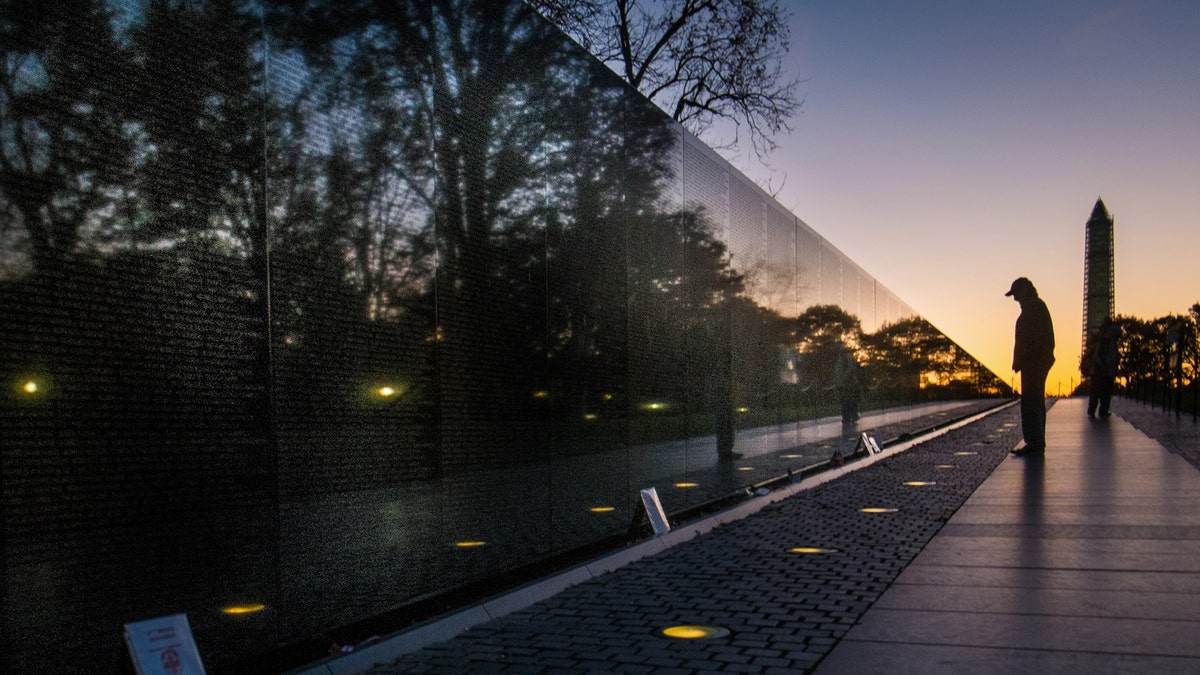
A visitor at the Vietnam War Memorial in Washington passes early in the morning on Veterans Day, Monday, Nov. 11, 2013, to look at the names inscribed on the wall. Several ceremonies are scheduled in the Nation's Capitol to honor those who have served in the U.S. military including a wreath laying at Vietnam War Memorial. The Washington Monument is at right. (AP Photo/J. David Ake) (ap)
As a veteran of the Iraq War, I greatly value Veterans Day and the efforts to commemorate the selfless sacrifices of our Veterans. Today is a timeless reminder that our liberties come at a cost and are defended by the men and women in uniform who honorably volunteer and answer a calling, of many times, thankless duties and assignments.
I am glad that my countless occasions of suiting up in military protective gear in scorching desert weather for vehicle convoys and helicopter rides, hiding in bunkers after mortar attack alerts, and other unsung efforts do not go unnoticed. However, my efforts pale in comparison to one such military group whose efforts have been significantly overlooked, the 65th Infantry Regiment’s, the “Borinqueneers” of Puerto Rico.
The time is now to promote and memorialize Latino contributions and advance the Latino image amidst society’s contemporary negative perceptions of Latinos.
Established in 1899, the 65th Infantry Regiment was a predominately group of Puerto Ricans and fought in WWI, WWII, and most notably the Korean War. The Borinqueneers were the only Hispanic-segregated active-duty unit ever in the U.S. Armed Forces and, under adverse, challenging, circumstances, exceeded the expectations of the military command leadership during the Korean War.
Among their many exploits, they were responsible for the last regimental-sized bayonet assault against the enemy and, also, they were one of the vanguard units opening an evacuation corridor for the enemy-encircled U.S. Marines in one of the most epic withdrawals is U.S. history, thus being one of the last units on the evacuation ships.
General Douglass MacArthur wanted the Borinqueneers in the Pacific during WWII and was denied the 65th Infantry because of a prejudicial report from the Pentagon. Later on as commanding officer over them in the Korean War, he quoted, “I wish they were more like them…” The Borinqueneer story is one of Hollywood caliber and one that needs to be memorialized and woven in the fabric of American culture in like fashion with the famed segregated units of the Tuskegee Airmen, the Nisei-Japanese Soldiers, the Navajo Code Talker Marines and the Montford Point Marines.
Moreover, although the 65th Infantry Regiment was primarily composed of Puerto Ricans, they were elements of African Americans, Philippines, Virgin Islanders and Mexican-Americans. Most notably, the only four-star Latino general in the Army, General (retired) Richard Cavazos, fought with the 65th Infantry in Korea and he is of Mexican descent. He earned the Army’s highest military decoration, the Distinguished Service Cross, as a Borinqueneer.
It must also be underscored that there were many other great units in the Korean War and all wars. However, the 65th Infantry Regiment was a group who exemplified great valor above much adversity and clearly left its indelible mark in history and Latino culture.
Their cultural imprint is evident in the various memorials and monuments in Puerto Rico and the nation, however more needs to be done. Currently, I spearhead a national volunteer group, the Borinqueneers Congressional Gold Medal Alliance, which is dedicated in seeking the Congressional Gold Medal (CGM) for the Borinqueneers.
The Congressional Gold Medal is the nation’s highest civilian award and although it parallels the Presidential Medal of Freedom, in my opinion, the CGM award is slightly more prestigious because of its award frequency and more stringent requirements. Out of 155 CGM recipients since 1776, only one other Latino-American has earned the CGM distinction, Baseball Hall-of-Famer and humanitarian, Roberto Clemente. Even then, unfortunately, Mr. Clemente had to pass away in order to receive such recognition.
While I am not a certified historian, I am almost certain that there have been many Latino-American pioneers and game-changers that have positively shaped society since 1776 which are equally merited the prestigious CGM distinction. Per the CGM requirements, there are two Congressional bills both in the House of Representatives and the Senate. Each bill needs two-thirds co-sponsors of each chamber in order for the bills to be considered for approval.
While this is a daunting task to achieve, supporters and organizations around the nation have rallied to create the groundswell of support helping drum up 54 percent and 33 percent of the required co-sponsors respectively in the House of Representatives and the Senate. This is highly impressive given that that the House and Senate bills were introduced on April 25th and June 18th, respectively, this year.
However, we have until the end of 2014 to garner the necessary co-sponsors so we need to continue fueling this momentum in order to be successful. Otherwise, this historic campaign may not repeat itself and thus we will find ourselves, yet again, falling short of making history for ALL Latinos.
Individuals around the nation need to contact their congressional officials and two U.S. Senators and urge them to co-sponsor non-partisan Bills H.R. 1726 and S. 1174. Help spread the word among your networks, radio and news media. Now is the time to exercise our civic empowerment and make a difference. Now is the time to exercise our rights which our Veterans have so nobly defended and at times, paid the ultimate sacrifice. We ALL need to take ownership of this historical and landmark initiative.
The last time a recognition of this magnitude occurred for Latinos was when President Ronal Reagan expanded Hispanic Heritage Week to a month in 1988. The time is now to promote and memorialize Latino contributions and advance the Latino image amidst society’s contemporary negative perceptions of Latinos. Let’s recognize and enshrine a valiant group in our nation’s history and leave an enduring legacy for our Latino generations to come.
